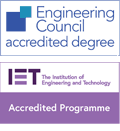Course overview
It adds an advanced practice module to our one-year master’s and is an opportunity to enhance your qualification by an internship, research or study abroad experience.
This course has been specifically designed to facilitate further learning for those involved in, or with an interest in, the field of electrical power engineering including the renewable energy systems sector. The course comprises five 20 credit subject specialist modules.
The course aims to deepen the students’ knowledge of subject areas previously studied as part of their first degree (i.e. electrical engineering). The course is built around two discipline specific specialist threads and one future facing thread.
The specialist threads are electrical power networks (comprising: Smart Grids, Microgrids, Future Energy Demand) and power electronic applications (comprising: Renewable Energy Generation, Power Conversion for Energy Systems). These specialist threads have been chosen to provide employment opportunities in a wide range of industries especially in the electrical power engineering sector, but additionally electrical power system skills for related renewable energy industries.
There are three routes you can select from to gain a postgraduate master’s award:
- MSc Electrical Power and Energy Systems – one year full time
- MSc Electrical Power and Energy Systems – two years part time
- MSc Electrical Power and Energy Systems (with Advanced Practice) – two years full time
The one-year programme is a great option if you want to gain a traditional MSc qualification. The two-year master’s degree with advanced practice enhances your qualification by adding a vocational or research-based internship to the one-year master’s programme. A vocational internship is a great way to gain work experience and give your CV a competitive edge .A research internship provides you with the opportunity to develop your analytical, team-working, research and academic skills by working alongside a research team in an academic setting. We guarantee a research internship, but cannot guarantee a vocational internship. We will, however, provide you with practical support and advice on how to find and secure your own vocational internship position should you prefer this type of internship.
Course details
Course structure
Core modules
Advanced Practice is normally undertaken over a one semester period and has been developed to enable a student to gain real-world practical experience to enhance their employability and academic learning. Students will receive preparatory sessions to enable them to apply to internship opportunities, which normally include:
Vocational internships with external organisations based offsite
Research or development internships based on campus
Employer-led internships based on campus
Students will undertake an appropriate advanced practice opportunity to meet their skill set and aspirations, related to their course.
All students will be assigned an academic supervisor to provide academic and pastoral support throughout their internship. Students will be assessed through a reflective report on a pass/fail basis. This module does not count towards the overall classification of the degree.
You investigate an area of engineering and work independently to a level recognised to be at the forefront of the discipline. The topic can be in the form of a research project or a design project. Key skills in research and in knowledge application and creation will be developed through keynote lectures and self-managed independent study. You are required to demonstrate the capacity for a comprehensive and objective analysis, and for developing innovative and constructive proposals for the solution to the project topic.
Ambitious environmental targets are reshaping the electrical power sector. You explore the future demand for electricity in this context, working in a team to assess future energy scenarios, their implications and propose suitable strategies and solutions to address them. You gain an understanding of their knowledge and limitations and the importance of bringing in and working with people with a different knowledge base and skillset.
The microgrid is taught as an application to optimise renewable generation using energy storage systems to meet demand. Mathematical modelling of systems based power flow is demonstrated, integrated with renewable generators, power conversion and load controllers. Computer software to develop models to optimise the generation, and integrate it in the microgrid context using demand side management and storage. Microgrid planning and design forecasting demand, energy management, provision of ancillary services, Operation and control of Microgrids, Microgrid protection, and case studies are used to illustrate and assess the module.
Power Conversion for Energy Systems
The module provides students with an in-depth knowledge of Power Electronic converters as they are used on power systems to allow efficient transmission of power from generator to consumer. The modules will teach about the operation and design of the main converters and their applications. It provides a generic treatment of various converter topologies with an emphasis on critical design parameters. Applications including HV DC transmission, static VAr compensation and interconnection of renewable energy sources and energy storage systems to utility grid are considered.
The module provides students with in-depth knowledge of the theory and principles of renewable energy technologies used for electricity generation. The module focuses on the principles, design, operation and grid connected applications of wind and photovoltaic technologies, and contrasts these with conventional power systems, such as coal and gas. The module will inform the student of current practices and technological advances in the field of renewables and will provide an opportunity to develop computing and practical skills related to this area.
The module provides students with an in-depth knowledge of the principles of operation, design and utilisation of smart grids to optimise the transmission and distribution of power. It provides a generic treatment of various power system topologies with an emphasis on critical design parameters at distribution level and the evolution to the wider transmission network. The impact on existing networks and future developmental opportunities are considered alongside automation and control requirements. The module will also inform the students of recent technological advances in the field of electrical power transmission and will provide an opportunity to develop practical skills related to this area.
You will investigate how the role of the engineer is becoming more focused on serving society as well as industry and to recognise the impact of engineers’ decisions on society and the environment.
As engineers of the future, you will need to have a sustainable worldview, acknowledging international, cultural, and diversity issues in society. In addition, you will also be expected to solve complex problems with consideration for multi-perspective views, long-term effects, risk, and the impacts of decisions on society.
This module will examine the key topics surrounding sustainability in the context of engineering applications across a range of disciplines and key future challenges such as energy, transport, and construction.
The subjects will be taught through a combination of lectures and seminars. Lectures will develop key concepts and knowledge. Seminars will allow more focused examinations of important issues and approaches.
Modules offered may vary.
How you learn
You learn through lectures, tutorials and practical sessions. Lectures provide the theoretical underpinning while practical sessions give you the opportunity to put theory into practice, applying your knowledge to specific problems. Industry specific software is introduced and used in practical IT labs to ensure the relevant experience for career goals.
Tutorials and seminars provide a context for interactive learning and allow you to explore relevant topics in depth. In addition to the taught sessions, you undertake a substantive MSc research project.
In addition to the taught sessions, you undertake a substantive MSc research project and the Advanced Practice module. This module enables you to experience and develop employability or research attributes and experiential learning opportunities in either an external workplace, internal research environment or by studying abroad. You also critically engage with either external stakeholders or internal academic staff, and reflect on your own personal development through your Advanced Practice experience.
How you are assessed
Assessment varies from module to module. It may include in-course assignments, design exercises, technical reports, presentations or formal examinations. For your MSc project you prepare a dissertation.
Your Advanced Practice module is assessed by an individual written reflective report together with a study or workplace log, where appropriate, and through a poster presentation.
Entry requirements
You must have a second class (2.2) honours degree (or higher). We consider a wide range of first degree subjects including automation and control engineering, electrical and electronic engineering, electrical engineering, electrical systems, electronic engineering, electronic systems, instrumentation/control engineering, mechatronics, and robotics.
Students with a degree awarded outside the UK must also meet the University's minimum English language requirements.
International applicants who need a student visa to study in the UK should check our web pages on UKVI-compliant English language requirements. The University also provides pre-sessional English language courses if you do not meet the minimum English language requirement.
For general information please see our overview of entry requirements
International applicants can find out what qualifications they need by visiting Your Country
Employability
Career opportunities
As an electrical power and energy systems engineer you can be involved in designing, constructing, commissioning and lifecycle maintenance of complex energy generation, conversion and distribution systems.
Your work can include energy storage systems, control systems, management and efficient use of energy in building, manufacturing and processing systems. You can also be involved in work relating to the environmental and economic impact of energy usage.
Examples of the types of jobs you could be doing include:
- designing new electrical transmission and distribution systems
- managing maintenance and repair
- managing operations of existing systems
- managing operations of a wind turbine farm
- analysing the efficiency of hydroelectric power systems
- evaluating the economic viability of new solar power installations
- assessing the environmental impact of energy systems.
Information for international applicants
Qualifications
International applicants - find out what qualifications you need by selecting your country below.
Select your country:
Useful information
Visit our international pages for useful information for non-UK students and applicants.


